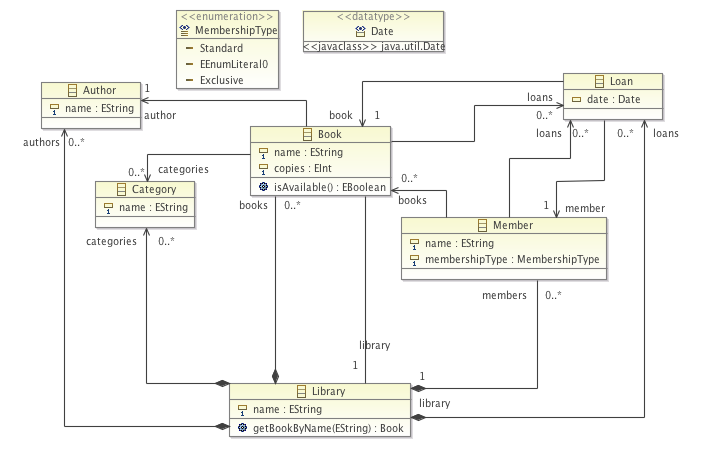Model Navigation and Modification
Basics
This page describes the navigation and modification support. The examples use the sample library model. All related code is available in the fr.unice.i3s.sigma.examples.library project.
TBW
Library Model
This is a slightly modified version of the library example from Eclipse OCL tutorial.

EMF Scala Support Generator
TBW
Navigation Support
TBW
Modification Support
TBW
Delayed Initialization
In some cases it is convenient to postpone initialization of an eObject. Sigma support delayed initialization that will be execute when the eObject is contained. For example:
// creates a new book
val sicp = Book(name = "SICP") initLater { e ⇒
// the code within this block will be executed once
// sicp has been contained
e.copies = 10
}
// the initLater has not been yet executed
sicp.copies must be(0)
//adds to library and executes initLater
library.books += sicp
sicp.copies must be(10)
The support is realized using EMF adaptors, concretely the PostponeContentInitializerAdapter. This adapter is added to every eObject instance that is created using the EMFBuilder.
Lazy Proxy Resolution
Sigma support automatic creation and lazy resolution of EMF proxies. This is handy when referencing non-contained objects. For example, in the following code we create an instance of a Book and assign it author to a reference, that will be resolved later.
val sicp = library.books +== Book(name = "SICP")
// the author setter is overloaded
// this expression is using the Option[Author] version
// it will create EMF proxy
sicp.author = library.authors find(_.name == "H. Abelson")
sicp.author.eIsProxy must be(true)
// when we add author the proxy will be resolved
library.authors +== Author(name = "H. Abelson")
// author proxy gets resolved
sicp.author.name must be ("H. Abelson")
sicp.author.eIsProxy must be(false)
The find method returns an Option[Author], which is an incompatible type with the author setter parameter. However, Sigma EMF support generator creates an extra setter for each non-contained reference that accepts an Option[A] where A is the type of the reference object.
// original setter
def author_=(value: Author): Unit = that.setAuthor(value)
// extra setter creating EMF proxy
def author_=(value: ⇒ Option[Author]): Unit =
that.setAuthor(LibraryPackageScalaSupport._libraryBuilder.ref(value))
The same technique can be used for non-contained reference list. For example:
val sicp = library.books +== Book(name = "SICP")
// categories are empty
sicp.categories must have size (0)
// add a category using the overloaded operator +=(value: Option[A])
sicp.categories += library.categories find (_.name == "Programming")
// a proxy has been created
sicp.categories must have size (1)
sicp.categories(0).eIsProxy must be(true)
// when we add category the proxy will be resolved
library.categories += Category("Programming")
sicp.categories(0).name must be ("Programming")
In this case the support is realized using an overloaded operator += defined on EList in EMFScalaSupport:
def +=(elem: => Option[A])(implicit proxyBuilder: EMFProxyBuilder[A]) {
that.add(proxyBuilder(elem))
}
For it to be usable, it requires an implicit parameter of type EMFProxyBuilder. That is an object that know how to create an EMF proxy of type A from an expression that resolves to Option[A]. For each EClass, the EMF Scala support generator generates one such a builder. For example in the class AuthorScalaSupport there is
protected implicit val _authorProxyBuilder =
new EMFProxyBuilder[Author](LibraryPackageScalaSupport._libraryBuilder)